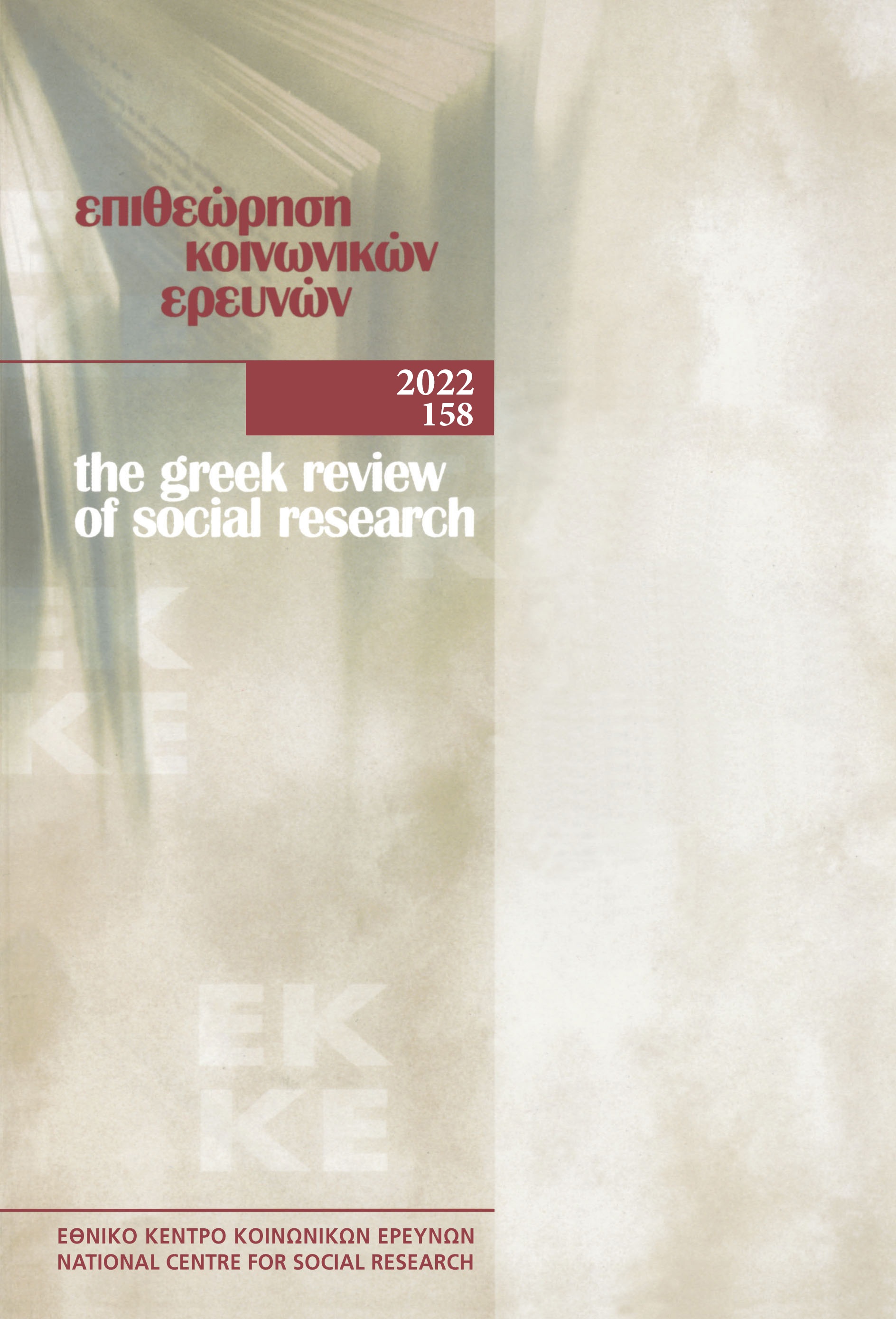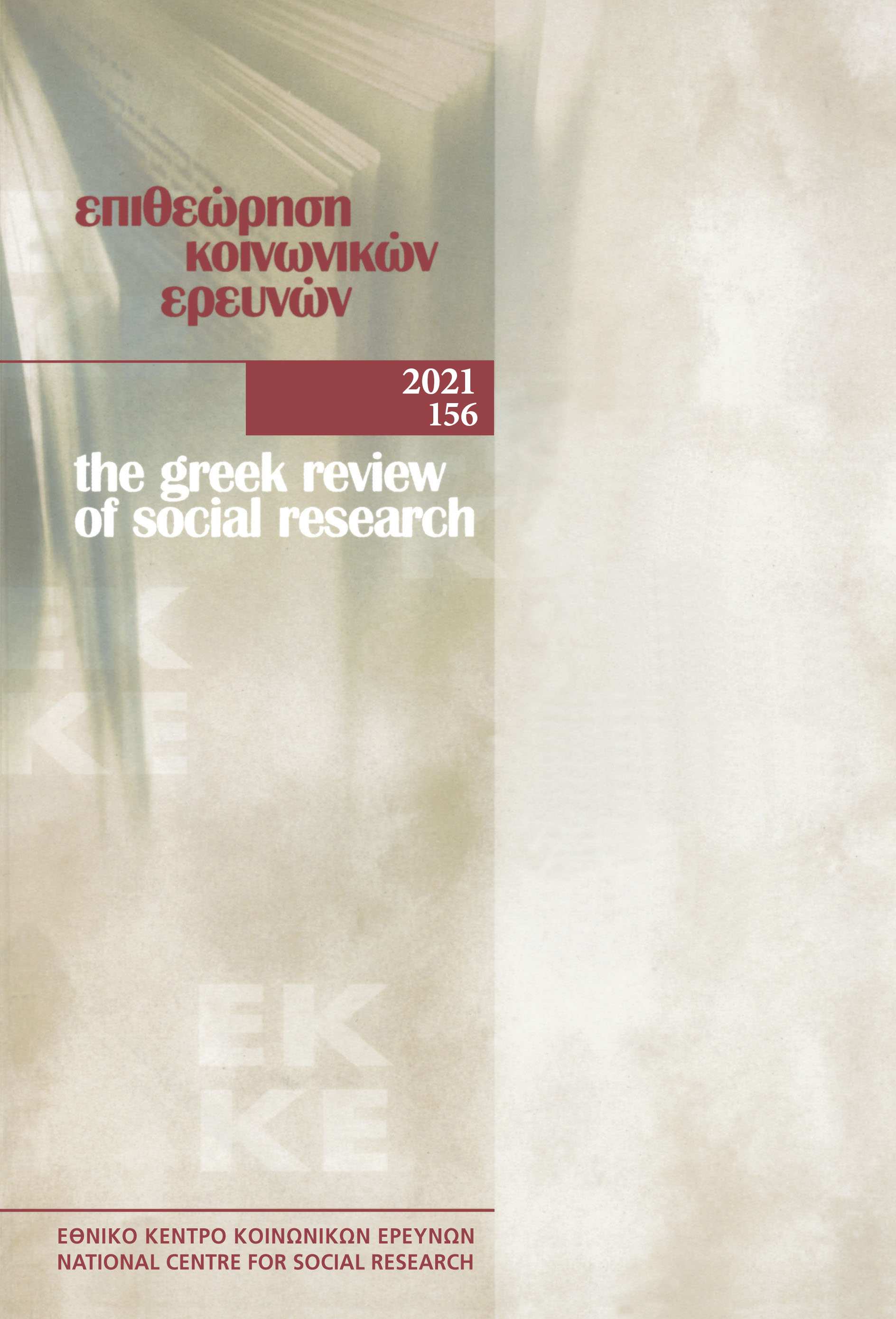Χωρο-γραφώντας ταυτότητες: συμβολικές διαστάσεις του χώρου στη συλλογική μνήμη της κοινότητας των Αιγυπτιωτών

Περίληψη
Το παρόν άρθρο εξετάζει τη διαδικασία παραγωγής Λόγων αναφορικά με την παρουσία των Ελλήνων στη σύγχρονη Αίγυπτο, αναδεικνύοντας τις αναπαραστάσεις του χώρου ως στοιχείο που θεμελιώνει διαχρονικά το συλλογικό αφήγημα και την ταυτότητα των μελών της παροικίας που έχουν μετεγκατασταθεί στην Ελλάδα. Υποστηρίζεται ότι η συσσώρευση του αποθέματος μνήμης μέσα από τις βιωματικές αφηγήσεις και τη διάδραση των Αιγυπτιωτών στα μέσα κοινωνικής δικτύωσης παράγει συγκεκριμένα μοτίβα σύνδεσης στοιχείων του χώρου με πολιτισμικούς κώδικες, κοινωνικές σχέσεις και εναλλακτικές τοπογραφίες που διατηρούν στον χρόνο την πρόσληψη της παροικίας ως οργανικού κοινωνικού συνόλου.
Λεπτομέρειες άρθρου
- Πώς να δημιουργήσετε Αναφορές
-
Souyioultzoglou, I. (2022). Χωρο-γραφώντας ταυτότητες: συμβολικές διαστάσεις του χώρου στη συλλογική μνήμη της κοινότητας των Αιγυπτιωτών. Επιθεώρηση Κοινωνικών Ερευνών, 158, 67–96. https://doi.org/10.12681/grsr.29386
- Τεύχος
- 2022: 158
- Ενότητα
- Άρθρα

Αυτή η εργασία είναι αδειοδοτημένη υπό το CC Αναφορά Δημιουργού – Μη Εμπορική Χρήση 4.0.
Οι συγγραφείς των άρθρων που δημοσιεύονται στην Επιθεώρηση Κοινωνικών Ερευνών διατηρούν τα δικαιώματα πνευματικής ιδιοκτησίας επί των άρθρων τους, δίνοντας στο περιοδικό το δικαίωμα της πρώτης δημοσίευσης. Άρθρα που δημοσιεύονται στην Επιθεώρηση Κοινωνικών Ερευνών διατίθενται με άδεια Creative Commons 4.0 και σύμφωνα με την άδεια μπορούν να χρησιμοποιούνται ελεύθερα, με αναφορά στο/στη συγγραφέα και στην πρώτη δημοσίευση για μη κερδοσκοπικούς σκοπούς.
Το Εθνικό Κέντρο Κοινωνικών Ερευνών διατηρεί το δικαίωμα να δημοσιεύει, να αναπαραγάγει, να παρουσιάζει στο κοινό, να διανέμει και χρησιμοποιεί άρθρα που δημοσιεύονται στην Επιθεώρηση Κοινωνικών Ερευνών σε οποιοδήποτε μέσο και μορφή είτε μεμονωμένα είτε ως μέρη συλλογικών έργων, για όλο τον χρόνο διάρκειας προστασίας της πνευματικής ιδιοκτησίας και για όλες τις χώρες του κόσμου. Αυτό περιλαμβάνει ενδεικτικά και όχι αποκλειστικά το δικαίωμα δημοσίευσης των άρθρων σε τεύχη της Επιθεώρησης Κοινωνικών Ερευνών, αναπαραγωγής και διανομής μεμονωμένων αντιγράφων των άρθρων, αναπαραγωγής ολόκληρων των άρθρων σε άλλη έκδοση του Εθνικού Κέντρου Κοινωνικών Ερευνών, καθώς και αναπαραγωγής και διανομής των άρθρων ή περίληψης αυτών με χρήση πληροφορικού συστήματος αποθετηρίου.



